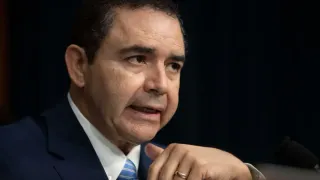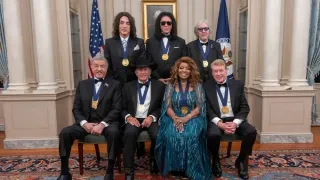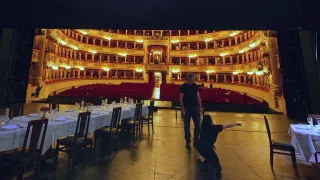October 17, 2018
Trump Tells AP He Won't Accept Blame If GOP Loses House
Catherine Lucey, Jonathan Lemire, and Zeke Miller READ TIME: 4 MIN.
Facing the prospect of bruising electoral defeat in congressional elections, President Donald Trump said Tuesday that he won't accept the blame if his party loses control of the House in November, arguing his campaigning and endorsements have helped Republican candidates.
In a wide-ranging interview three weeks before Election Day, Trump told The Associated Press he senses voter enthusiasm rivaling 2016 and he expressed cautious optimism that his most loyal supporters will vote even when he is not on the ballot. He dismissed suggestions that he might take responsibility, as his predecessor did, for midterm losses or view the outcome as a referendum on his presidency.
"No, I think I'm helping people," Trump said. "I don't believe anybody's ever had this kind of an impact."
Trump spoke on a range of subjects, defending Saudi Arabia from growing condemnation over the case of a missing journalist, accusing his longtime attorney Michael Cohen of lying under oath and flashing defiance when asked about the insult – "Horseface" – he hurled at Stormy Daniels, the porn actress who accuses him of lying about an affair.
Asked if it was appropriate to insult a woman's appearance, Trump responded, "You can take it any way you want."
Throughout much of the nearly 40-minute interview, he sat, arms crossed, in the Oval Office behind the Resolute Desk, flanked by top aides, including White House press secretary Sarah Huckabee Sanders and communications director Bill Shine. White House counselor Kellyanne Conway listened from a nearby sofa.
The interview came as Trump's administration was being urged to pressure Saudi Arabia to account for the disappearance of journalist Jamal Khashoggi. Instead, Trump offered a defense for the U.S. ally, warning against a rush to judgment, like with what happened with his Supreme Court nominee, Brett Kavanaugh, who was accused of sexual assault.
"Well, I think we have to find out what happened first," Trump said. "Here we go again with, you know, you're guilty until proven innocent. I don't like that. We just went through that with Justice Kavanaugh. And he was innocent all the way."
Weeks away from the midterms, Democrats are hopeful about their chances to recapture the House, while Republicans are increasingly confident they can hold control of the Senate.
Trump has been campaigning aggressively in a blitz of rallies aimed at firing up his base. He said he believes he's doing his job, but allowed he has heard from some of his supporters who say they may not vote this November.
"I'm not running," he said. "I mean, there are many people that have said to me ... 'I will never ever go and vote in the midterms because you're not running and I don't think you like Congress.'" He added: "Well, I do like Congress."
If Democrats take the House and pursue impeachment or investigations – including seeking his long-hidden tax returns– Trump said he will "handle it very well."
The president declared he was unconcerned about other potential threats to his presidency. He accused Cohen of lying when testifying under oath that the president coordinated on a hush-money scheme to buy Daniels' silence.
Trump on Tuesday declared the allegation "totally false." But in entering a plea deal with Cohen in August, federal prosecutors signaled that they accepted his recitation of facts and account of what occurred.
Trump said that Washington lawyer Pat Cipollone will serve as his next White House counsel and that he hoped to announce a replacement for U.N. Ambassador Nikki Haley in the next week or two. He again repeated his frustration with Attorney General Jeff Sessions over the special counsel investigation, saying, "I couls fire him whenever I want to fire him, but I haven't said that I was going to."
On the ongoing Russia investigation, Trump defended his son Donald Trump Jr. for a Trump Tower meeting with a Kremlin-connected lawyer offering damaging information about Democrat Hillary Clinton. Trump called his son a "good young guy" and said he did what any political aide would have done.
Trump again cast doubt on climate change, suggesting, incorrectly, that the scientific community was evenly split on the existence of climate change and its causes. There are "scientists on both sides of the issue," Trump said.
"But what I'm not willing to do is sacrifice the economic well-being of our country for something that nobody really knows," Trump said.
He added: "I have a natural instinct for science, and I will say that you have scientists on both sides of the picture."
Asked about his wartime leadership, Trump acknowledged that he has not brought U.S. troops home from conflict zones overseas and that there are more Americans serving in harm's way now than when he took office.
"It's not a lot more. It's a little bit more," he said.
Saying he's trying to preserve "safety at home," Trump added that if there are areas where people are threatening the U.S., "I'm going to have troops there for a period of time."
Trump increased U.S. troop totals in Afghanistan by about 4,000 last year.
The president engaged on several other topics, including:
– He said he has given no consideration to pardoning Paul Manafort, his former campaign chairman who was convicted of numerous financial crimes.
– He suggested that his second summit with North Korean leader Kim Jong Un would happen after next month's midterm elections and would likely not be in the United States.
– He broke with Senate Majority Leader Mitch McConnell's proposed changes to Social Security to control the deficit.
– And he defended his decision to break from his predecessors and not yet visit a military base in a combat zone, claiming it was not "overly necessary."
Repeatedly stressing what he saw as the achievements of his first two years, Trump said he'd be seeking another term because there was "always more work to do."
"The new motto is Keep America Great," Trump said. "I don't want somebody to destroy it because I can do a great job, but the wrong person coming in after me sitting right at this desk can destroy it very quickly if they don't do the right thing. So no, I'm definitely running."
___
Associated Press writer Colleen Long contributed to this report.






